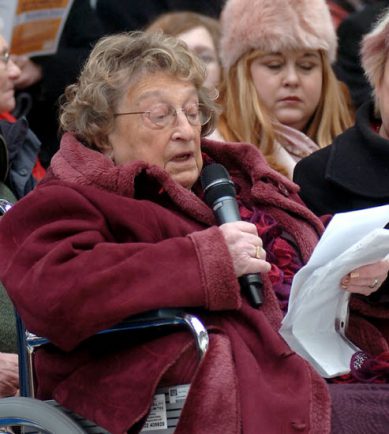MORE than 70 years ago as she lay in a hole in the darkness wondering how much longer she would live, Iby Knill made a promise.
A girl had crawled over to her and made her swear if she survived she would tell the world the horror suffered inside Auschwitz-Birkenau at the hands of the Nazis.
She told Iby she was only being kept alive because she was a twin and they were being subjected to vile and inhumane experiments and once they were no longer useful they would face the gas chamber, like their parents.
It was a promise that would take until 2010 for Iby to fulfil when she finally told her story, for during the decades following her liberation she ‘went around’ the fact she was a holocaust survivor while her time was occupied by her family, her own design business, several other high profile jobs and getting a masters degree in her late 70s.
It was only during a discussion about the Holocaust while taking a Theology class that Iby finally admitted what she had been a part of and was encouraged to deliver on the pledge she had made. It hadn’t been an easy memory to carry around with her and even though over the last four years she has spoken to more than 25,000 people across the world, had her story published in a book and been featured on the BBC, it doesn’t get any easier for the 91-year-old.
“I buried it to such an extent during my first years in England I couldn’t even get my mouth around German, because you can’t take just that part you have to take a whole section of your past and just bury it.” she said.
“It came at an emotional cost but then I decided if I didn’t put it behind me I wouldn’t have a life. Many of the people who could not stop talking about it finished up in mental institutes or committed suicide and if you wanted to live, and I had children to live for, you just had to put one foot in front of the other and carry on living.
“It was quite a painful process to bring it back again and even today, talking about it doesn’t get any easier. It’s not the things I tell you I remember, it’s the things I don’t tell you because I don’t believe in telling horrors, there’s no purpose in it.”
She was born in Kosice in Czechoslovakia but grew up in Bratislava. Her father had been an officer in the Hungarian army, her mother was Czech, her nanny and governess were both German and the household staff were Slovak. As a result Iby could speak four languages, a fact she believes ‘probably saved my life’.
Religion was not a major part of her family life, in fact it only first became an issue when she had to leave the German Grammar school she was attending because her mother was a Jew. They also lost their business, home and were crammed into a one room apartment with her brother sleeping on a board over the bath and Iby on a ‘put me up’ in the kitchen.
It was part of the introduction of the Nuremberg laws which restricted what Jews could do and ordered them to single themselves out by wearing a yellow star.
“Suddenly somebody I knew from school would cross the road so as not to know me.” she said.
“I spent all of my time queueing up to get enough food for us to survive as the shops wouldn’t serve you if you had a yellow star and even if they did they would serve others first even if they came in after you.
“I was very, very angry and I think I remained angry, I’m still angry about it.”
In early 1942 Iby had to be smuggled out of the country as Jewish girls were being rounded up to be used as prostitutes for German
soldiers on the frontline. She was taken to the Hungarian border to her aunt’s who refused to have her so she went to stay with her cousin. Iby was now 18-years-old and an illegal immigrant, forced to spend her days in silence, trapped indoors in fear of discovery.
But when her cousin was called up for the Hungarian army, she was sent to a solicitor friend of his who turned out to be a member of the resistance movement helping airmen escape, which Iby got involved in. By the time the organisation was compromised and they were both arrested, they had contributed to the escape of 428 people.
Iby was subjected to torture for information and imprisoned in a jail in Budapest for three months. When it was decided she had no information she was released and then rearrested and sent to a detention centre and then a refugee camp where she worked in the fields. She also received news some of her family had escaped and were being held in an immigration centre in Budapest. Iby was allowed out to visit them and met a Hungarian man who she planned to marry and take his nationality, allowing her and her parents to
stay legally in Hungry.
In March 1944 she was released on parole and allowed to nanny for a distant family member in Szekesfehervar with the date of the wedding set for June 12. But then fate cruelly intervened.
On the evening of June 5, Iby was on her way to see some friends when an air raid took place. The rules stated you had to be indoors during the raid so she was unable to return home. At 5am the following day police came and told Iby, even though she was not supposed to be there, she would have to go with the family. They were among 3,000 people who simply disappeared that night.
She was taken to a brickyard and held. While there Iby helped nurse Jewish patients who had been forced out of hospitals.
On the morning of June 12 instead of preparing for her wedding she was on her way to Auschwitz as a political prisoner along with hundreds of others in cattle wagons. The journey lasted five days.
On arrival she was taken into Birkenau and made to strip while her body was shaved of all hair. She watched as those with gold teeth had them ripped from their mouths.
“There were SS men standing around laughing, they thought it was funny, we did not think so.”
After being dressed in just a piece of cloth, hundreds of them were crammed into tiny huts. The only way to lie down at the end of the day was like spoons, such were the conditions and food consisted of watery soup. Every day they were made to strip and hold their rags above their heads. If they moved they were taken away and never seen again.
“The rest of the time we would sit and we would talk but not about our families or homes or about the possible future, the only thing we talked about was food and not fancy food, what I was dreaming of was mashed potato. How low can you get to dream of mashed potato?” Iby added.
“Once a week we were taken to be showered. We didn’t know if it was a shower or to be gassed as it was the same place for both and the smell from the crematorium was the smell of burning flesh.
“They say it was a godforsaken place and that was how it felt, as if it was a place God didn’t want to know, it was too bad. It was basically friendship, supporting each other together that got us through.”
While on one journey to the showers Iby was hit on the leg by a German soldier for lapping rainwater from a puddle, tearing the muscle.
Iby volunteered to leave the camp on a labour transport to go and work as a nurse in an armaments factory in Lippstadt in Germany.
But with allied forces closing in they were told to leave there and follow some SS men to Bergen Belsen on foot.
They had to march in the dark and were hidden in barns during the day, Iby suspects to hide from the German population ‘what was going on’. Those who lagged behind were shot and Iby needed the help of friends to keep up because of the injury to her leg.
After five nights they reached Kunitz where they were told to lie down in a field. And then the soldiers disappeared as they had seen American troops closing in.
“Hundreds of women in rags jumped out of the field and surrounded the tanks. I don’t know what the feeling of the Americans was but it must have been an unforgettable event for them, it certainly was for us.”
However the troops were part of a pincer movement and the survivors were told it would be several days before the town would be occupied by Allied Forces. Iby was taken to a nearby farm house where she was presented with a special gift.
“At the table in the centre of the room was an elderly man, a woman and a little girl. She whispered something to her mother and the mother nodded and she came to me with her hand held out and in her hand was a painted egg and she said ‘It is Easter Sunday’. Any day is nice to be liberated on but for it to be Easter Sunday was rather special.”
Iby could not face going back to any kind of holding camp once British forces had occupied the town and so instead used her language skills to work for the Military Government and Control Commission from April 1945 until September 1946.
It was there she met her husband Bert, a British Army officer, and they were married in Bratislava December 1946 and later made a life in England. She also found out her mother, brother and cousin had survived the Holocaust but her father had been gassed on October 24, 1944 at Auschwitz, just before the Germans destroyed the gas chamber and crematorium.
Although it remains a painful story to recall, Iby is determined to continue to tell it for as long as she can, for she is yet to be convinced mankind has learned its lesson.
And the rise in popularity of right wing political parties across Europe, fuelled by struggling economies, is a warning the world needs to take heed of.
“You don’t have to be German to be a Nazi. We still have the equivalent event today all over the world.” she said.
“We have to teach young people that 11th commandment, that under the skin we are all the same and they have to learn to accept and value difference – being different makes life interesting.
“Unless we can instil that in young people and counter the fanatical ideology that can be input in to their minds mankind is going to be an extinct species, we are going to kill each other off, there won’t be a human being.”











